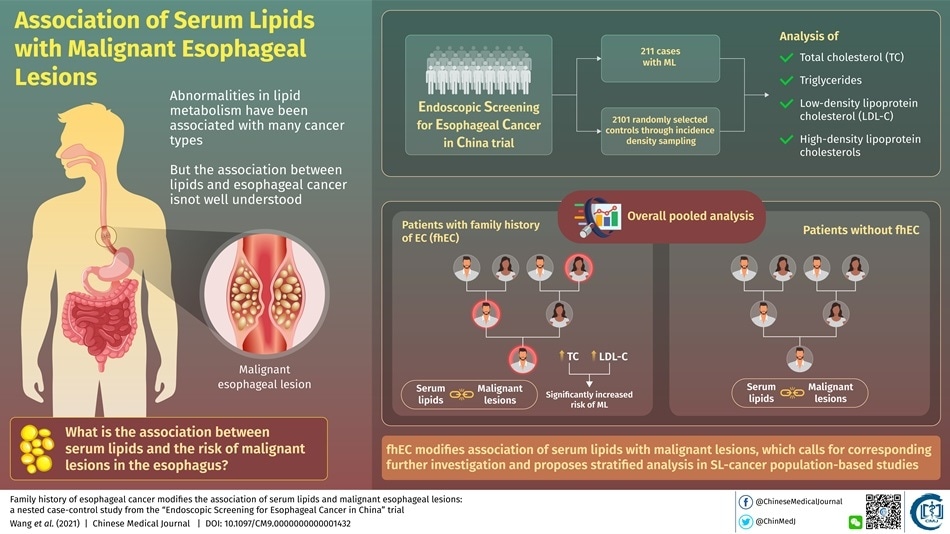Several studies have associated blood lipids with different types of cancer like that of the food pipe or “esophagus,” but much remains to be understood, to apply this knowledge clinically. A group of Chinese scientists has successfully advanced this line of research, by identifying the role of family history in modifying the association between blood lipids and risk of developing esophageal malignant lesions, according to a new study published in Chinese Medical Journal.

Image Credit: Chinese Medical Journal
Fat biomolecules in the blood, called “serum lipids,” are necessary evils. They play important roles in the lipid metabolism and are integral for the normal functioning of the body. However, they have a darker side; according to several studies, they are associated with various cancers. The medical community has fathoms to go before truly understanding the implications of different serum lipid levels in cancer.
As a major step in this direction, a group of scientists from the Key Laboratory of Carcinogenesis and Translational Research, Laboratory of Genetics, Peking University Cancer Hospital and Institute; Hua County People’s Hospital; and Anyang Cancer Hospital, have successfully determined that a family history of esophageal cancer modifies the association between serum lipids and risk of developing cancerous esophageal lesions, according to a pioneering study published in Chinese Medical Journal.
Many individuals undergo routine lipid profile checkups, but most people and doctors only focus on the risk of cardiovascular diseases, and unwittingly fail to look deeper into the results. What if the change in serum lipid levels is an sign of the risk of having malignant esophageal lesions?
To answer this question, Chinese medical researchers analyzed data from the “Endoscopic Screening for Esophageal Cancer in China” trial. The trial included analysis of serum lipids like total cholesterol (TC), triglycerides, low-density lipoprotein cholesterol (LDL-C), and high-density lipoprotein cholesterol from 211 individuals with malignant esophageal lesions, and 2101 “control” individuals who didn’t have the lesion.
Although the team’s initial analysis of data showed that there is no consistent association between serum lipid levels and risk of developing malignant esophageal lesions, a simple family history check—and deeper analysis—told a different story. Particularly for cases with a family history of esophageal cancer, high levels of TC and LDL-C were linked to a significantly higher risk of developing malignant esophageal lesions. Also, when such family history was not identified, there was a notable negative association between the same parameters. Better to know late, than never, right?
Professor Yang Ke from Key Laboratory of Carcinogenesis and Translational Research, Laboratory of Genetics, Peking University Cancer Hospital and Institute, Beijing, who is also one of the lead scientists of the study, thinks so. In this regard, Professor Ke jubilantly says, “We found that the association of serum lipids and malignant esophageal lesions might be modified by esophageal cancer family history. This finding provides population-level evidence in research at the interface of serum lipid biology and esophageal carcinogenesis.”
Further, the findings of this study shed light on the importance of considering a ‘stratified’ analysis on such population-based studies. A relevant example is a stratification this study proposes, in terms of those with and without esophageal cancer family history. This stratification helped the researchers have a better understanding of the data from the trial considered. Moreover, Dr. Meng-Fei Liu, from Laboratory of Carcinogenesis and Translational Research, and the other corresponding author of this study, thinks that this research is far from its endpoint.
The stratified analysis would be crucial for population-based studies investigating the association of serum lipids and cancer. However, the mechanism by which a family history of esophageal cancer modifies this association warrants further investigation.”
Dr. Meng-Fei Liu, Laboratory of Carcinogenesis and Translational Research
Overall, this study has paved the way for a better understanding of the role of serum lipids in esophageal carcinogenesis in cases involving esophageal cancer family history. While the medical community continues to look for further advances, which could be translated into future clinical applications in such population-based cancer research, this study has definitely given us much to think about; the signs of cancer may be in our blood, in more ways than one!
Running in the Blood: Blood Lipids Are Linked to Cancer, But Depending on Family History
The association between serum lipids and risk of developing malignant esophageal lesions might be influenced by the status of esophageal cancer family history, scientists say. Credit: Chinese Medical Journal
Source:
Journal reference:
Wang, M-M., et al. (2021) Family history of esophageal cancer modifies the association of serum lipids and malignant esophageal lesions: a nested case-control study from the "Endoscopic Screening for Esophageal Cancer in China" trial. Chinese Medical Journal. doi.org/10.1097/CM9.0000000000001432.